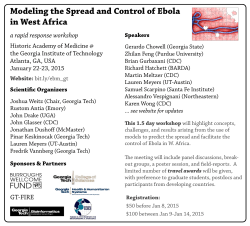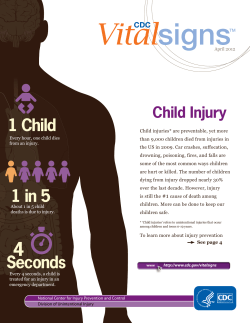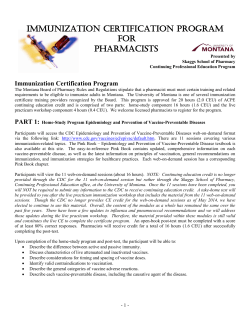
Division of Global Public Health Protection Centers for Disease
Division of Global Public Health Protection Centers for Disease Control and Prevention (CDC) Office of Global Health FY 2016 Labor HHS Appropriations Bill 2014 Global Public Health Protection (CDC) $62,598,000 2015* $55,119,000 2016 President $76,694,000 2016 TFAH $76,694,000 *FY2015 totals do not include emergency Ebola supplemental funding - GPHP received $30 million for Ebola response, National Public Health Institutes and global health security activities. Background: The Division of Global Health Protection (DGHP) protects Americans and people around the world from the leading public health threats. The Division builds the capacities of local, national and regional public health to detect emerging threats, prevent disease and prepare for and respond to public health emergencies. The DGHP consists of: Global Health Security Branch, which leads CDC’s global health security mission with other U.S. government agencies and international organizations such as WHO and World Bank and assists partner countries in preparing for and responding to public health emergencies. Field Epidemiology Training Program (FETP) Branch, which supports local workforce training, modeled after CDC’s Epidemic Intelligence Service, to help countries build their own sustainable capacity to detect outbreaks. Global Disease Detection (GDD) Branch, which supports GDD Centers in 10 countries that work with local ministries of health to develop core capacities such as emerging infectious disease detection, field epidemiology and laboratory capacity, and zoonotic disease detection and response, as well as cooperative agreements with academic partners and ministries of health. Emergency Response and Recovery Branch (ERRB), which leads CDC’s response to complex humanitarian emergencies, such as the Haiti earthquake. Noncommunicable Disease (NCD) Unit, which aims to advance global prevention of injuries, chronic diseases, disabilities, and environmental hazards through public private partnerships. DGHP is CDC’s lead in achieving the targets of the Global Health Security Agenda,1 an international agreement to build capacity to prevent avoidable outbreaks, detect threats early, and respond rapidly and effectively. Impact: The division’s work by program includes: Field Epidemiology Training Program (FETP) (53 countries), Global Disease Detection (GDD) Centers (10 countries), Global Health 1 HHS, The Global Health Security Agenda, 2014. http://www.globalhealth.gov/global-health-topics/global-healthsecurity/ghsagenda.html. CDC: http://www.cdc.gov/globalhealth/security/. 1 Security (GHS) (17 countries) and National Public Health Institutes (NPHI) Program Areas (13 countries): During 2013-2014, DGHP achieved significant accomplishments: GHSA helped build a pilot antimicrobial resistance surveillance system and strengthened molecular diagnostic capacity in Thailand, built a regional animal zoonotic disease station and conducted CBRN training for government agencies in Vietnam, led microbiological lab training in India, and conducted MERS-CoV and incident command training in Jordan. GDD enabled response to 268 global disease outbreaks and over 145 humanitarian missions in 35 countries, including outbreaks in Syrian refugee populations, MERS-CoV, dengue, H5N1 and H7N0 influenza and the Ebola outbreak in West Africa. CDC also discovered a new species of the Orthopox family in 2013. Since its inception, GDD has provided rapid response to more than 535 outbreaks and discovered 51 new pathogens. Recommendation: TFAH supports the President’s request of $76,694,000 for the Division of Global Health Protection, a $21.6 million increase over FY2015. $11.6 million of the increase would be directed to Global Health Security, to help expand implementation of the Global Health Security Agenda in additional countries, with hopes of reaching at least 30 partner countries in the next five years. CDC will fund awards to ministries of health, academic institutions and private sector entities. After establishing a baseline of capacity, U.S. investments would decrease in future years. $10 million of the proposed increase would support Global Public Health Capacity development to help nations develop capacity to address ongoing threats such as tuberculosis and vaccine-preventable diseases, as well as emerging infections. Capacitybuilding activities include working with ministries of health to develop a well-trained public health workforce; providing technical assistance to develop disease detection and response systems; and collaborating with in-country partners to improve efficiency and coordination of country-level public health activities. Through this funding, CDC anticipates responding to at least 100 disease outbreaks globally in 2016. 2
© Copyright 2025















